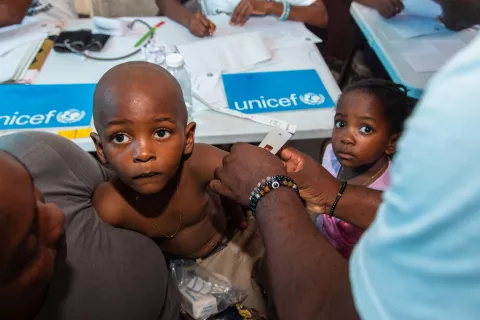The impact of hurricanes Eta and Iota
“It pains me to see many houses and schools still buried under sand or covered in mud in the communities affected by the hurricanes”, Jean Gough

- Available in:
- Español
- English
Hurricanes Eta and Iota caused floods and destruction across Guatemala and other countries in Central America, affecting 3.5 million children. In the middle of the global COVID-19 pandemic, communities that lost everything face the challenge of rebuilding their lives. UNICEF’s Regional Director for Latin America and the Caribbean, Jean Gough, visited the hardest hit areas of Guatemala and Honduras to supervise UNICEF’s humanitarian response to improve the lives of children, teenagers, and their families.

Schools —once spaces filled with joy and curiosity— are deserted today, devastated by the catastrophe in Guatemala. Desks, books, notebooks, computers, chalkboards, everything is dyed shades of ochre and caked in layers of dry mud -- a cruel reminder of the water's fury.


In the small village of Jimeritos, close to the Honduran border, three-year-old Antony Aguirre plays with a hula-hoop during the recreational activities organized by UNICEF to provide psychosocial support for the youngest members of this community impacted by the two hurricanes, Eta and Iota. Saira Ruano, the boy’s mother, recalls spending nine days living by the highway under plastic sheeting after Eta hit the village. After Iota, the family spent ten more days in the same conditions.
“We come here every time there are activities because my son enjoys them very much. Before, he would watch television, but since that got wet, I think it’s better that I bring him here now”, Saira Ruano explains.

Dozens of school desks, useless and covered in mud, were piled up outside while the classrooms inside looked empty and faded. Amid this gray and sterile landscape, Azucena Arevalo, the principal and only teacher for six grade levels at the local Official Rural Mixed School, wonders where she will seat students when they return to school.
“We lost the furniture. We don’t have anything. I cried the day I came to see all the effort that had been lost”, Azucena Arevalo admits.


Not only schools suffered damages beyond repair. Also affected were 56 wells in the village of Jimeritos, and 65 more wells damaged in the neighboring village of El Eden Nueva Vida, another tiny community located in the department of Puerto Barrios.

UNICEF and its partners, with the support of local authorities including the Mayor and local Development Councils, have begun a sanitary process including evaluation, cleaning, and disinfection of wells so that families can once again have access to safe water, a fundamental step to protect the health of children and prevent the propagation of diseases.


Located in the municipality of San Pedro Carcha in Alta Verapaz, is the village of Campur where the storms left 537 homes under water for months. Boats and watercraft had to travel to the area to rescue and organize townspeople. In the first weeks of 2021, the water began to recede and Campur began to dry out.
The evaluation was dramatic: most families lost absolutely everything.

At the age of twelve, Giancarlo Iquibalam Choc demonstrates an astounding level of maturity in the face of tragedy: “We don’t know where we are going to study. We’ve been battered psychologically by Eta and Iota. Campur was affected in a very horrible way. There used to be a bunch of computers here. I used to study with my classmates, but now all that is gone”, Giancarlo says.
“It’s very sad what’s happening, we just ask for a small helping hand so that we can at least rebuild everything that was lost”, he adds.

Marta Alicia Che Caal (25) and her three-year-old son, Jeremias Daniel, spent more than a month living in three different shelters. “The National Coordinator for Disaster Relief assessed the houses and said we could return home in 25 days. I’ve been desperate at times, he (Jeremias) starts crying and has said: ‘Mother, let’s go back’. It’s difficult for him to adjust, he says: ‘What if we ask the boat to take us back home?’”.

Jean Gough, UNICEF’s Regional Director for Latin America and the Caribbean, traveled to Guatemala and Honduras to visit the most affected communities and see the impact on the most vulnerable children firsthand. “Two months after the two strong hurricanes slammed into Central America, the humanitarian needs of families with children and adolescents continue to be generalized and will be quite lasting”, Gough explains.


“Many wells have been contaminated and water infrastructure has been damaged and destroyed. Without an urgent response, many more children and teenagers will likely suffer malnutrition, leave school, and fall into poverty”, Gough says.
Gough doesn’t want this school year to be another lost year for youth: “Schools are about more than learning. They offer a meal, protection, socialization, a child can learn to play… A school is a place that unites a whole community”.
“We have to open the schools. We can’t afford the luxury of another lost school year. Life must go on for the children”, Gough says.



